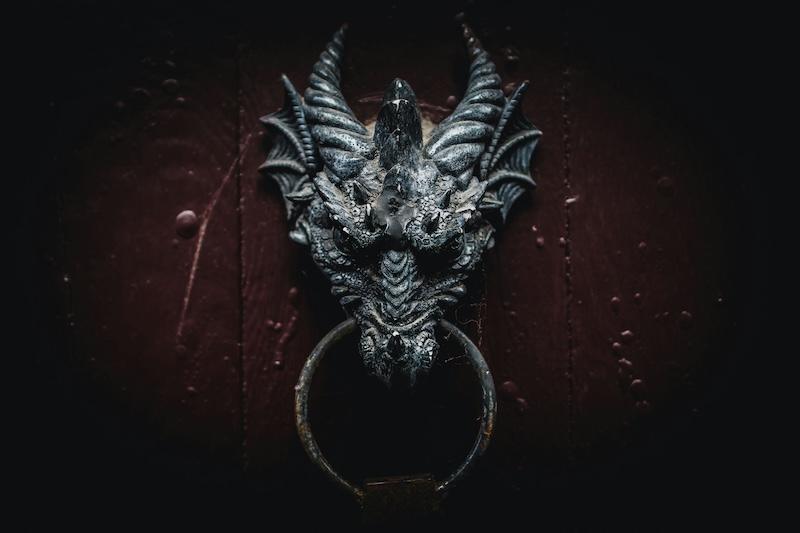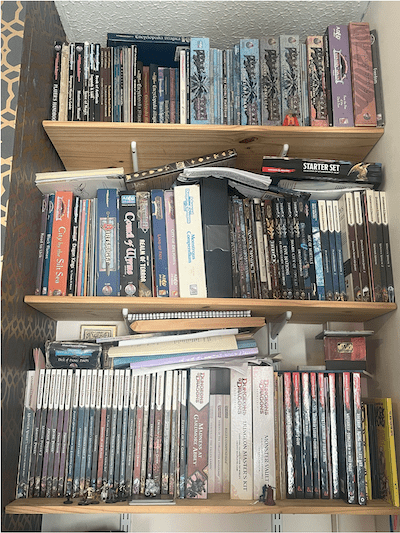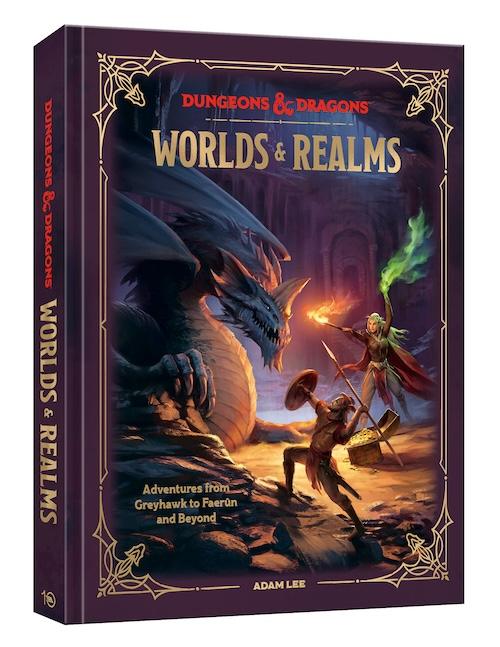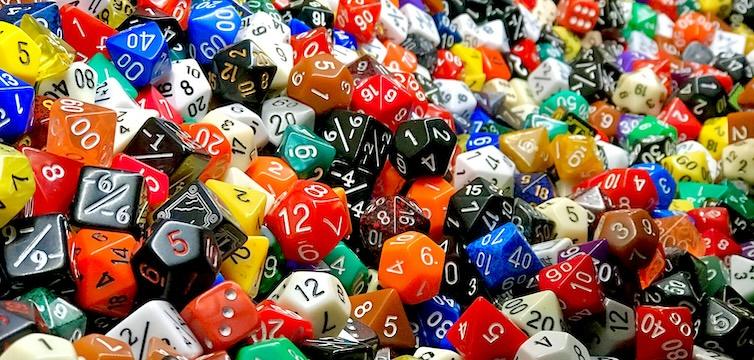With the 50th anniversary of D&D upon us, Matthew Palmer contemplates the impact that 35 years of playing RPGs has had on his writing.

It was just over 50 years ago that a man named Dave Arneson first introduced fantastical elements into the experimental wargame ‘Braunstein’, creating the world of ‘Blackmore’ for his players to explore. Shortly afterwards, this caught the eye of Gary Gygax, an independent games designer and publisher who was prominent in the Lake Geneva wargaming scene. In 1974, after a couple of years collaboration, a boxed set of three white booklets were published, the first ever Dungeons and Dragons rule books, and the world of gaming and fantasy was changed for ever.
I’m not going to elaborate on the history of Dungeons and Dragons here; far better and more well researched writers have done far better jobs than I ever could. I recommend SF Debris ‘The Time of Dragons’ video series and Shannon Appelcline’s exhaustive history of RPGs ‘Designers and Dragons’ for those who want some more detail on how the game, and the business of RPGs, grew into what it is today.Â
What I’d rather talk about is something that has been on my mind for a while now. About six months ago, somebody on RPG.net’s creative writing subforum asked how RPGs had influenced each of us as writers. Now, I’ve only been writing for a couple of years, but I’ve been deeply invested in the RPG hobby over 35 years. It was a question I struggled to answer. In fact, it was only when I made a commitment to stepping outside the DM’s screen — a position I had occupied for most of my gaming life — that I managed to free up some mental real estate and actually write something. Luckily the other members of my gaming group have been more than willing fill the gap, allowing me to experience being on the other side of the table far more often than usual.
The question stuck with me though. It seemed inconceivable that something that had been such a big influence on my life as D&D (and RPGs in general), wouldn’t have provided me with some positive influence.  As my friends and I have been traveling through the dark hills and forests of Barovia, seeking to lift the terrible Curse of Strahd from the land, I’ve been thinking more and more about Dungeons and Dragons and the influence that it’s had on my life.Â
Truth be told, though I had long wanted to become a writer, I had come to feel that my experience as a DM was detrimental in that regard. The role of a DM is, contrary to what it seems, not to tell a story but to facilitate one. They present a scenario, and the players then decide how they are going to act and how that story should unfold. Of course some DMs disagree and try to indulge only their own fantasies, seeing their players as some strange hybrid of a puppet and an audience. It’s common wisdom that those particular DMs are doing the hobby and their players a great disservice. The result of this was for the longest time, I was great at coming up with Ideas but terrible at coming up with Stories. I would accumulate pages of notes on settings, worlds, and high concepts, but when the time came to animate them with life and character, my creativity would dry up.Â
More than just a game

D&D is a larger concept than just the role playing game; it is a brand that expanded in many directions. It certainly exposed me to gateway fantasy novels – Wiess and Hickman’s Dragonlance Chronicles was my first experience of epic fantasy, made all the more special by the fact that I could re-experience it with my friends. Shout out here to the players in the Dragonlance campaign I ran in my final year of University: You all rock and it’s still my fondest memory of DM-ing even after all these years.
The authors of D&D were also very open about their inspirations behind the games. The roots of D&D owe as much (if not more) to Lieber and Vance than they do to Tolkien, and without D&D it’s likely I never would have experienced the delirious world of ‘The Dying Earth’ or the rambunctious adventures of Fafard and the Grey Mouser.
(Pictured: Matthew’s D&D shelves)
Similarly, D&D was responsible for widening my fantasy horizons. The Savage deserts of Dark Sun, the zany space adventures of Spelljammer and the infinite expanse of Planescape showed me that fantasy didn’t have to be Elves and Dwarves and Dragons, but it could be ‘effin weird. Those worlds are filled with insectoid scavengers, cities on the backs of spacefaring manta rays, and battles between warrior philosophers over the fate of the universe. That amazing burst of creativity that came from TSR in the 1990s sent ripples of influence through fantasy, with China Miéville openly acknowledging the influence of Planescape on his Bas Lag series. The post-apocalyptic Athas definitely has a lot of similarity to Jemisen’s Dying Earth series; I don’t know if it is a direct influence, but it certainly accounts for my love for it.
It’s only in the last couple of months that I’ve come to understand truly what D&D has done for me as a writer, though. For my first WIP, I went in with a pretty solid plan of what the story would look like and found that I was consistently surprised by the way that my characters would lead me down strange paths. When I came to work on my second WIP I decided to take my hands off the steering wheel and fly completely by the seat of my pants. It’s been a wild ride, no doubt, and it’s taken me and my characters on some very interesting journeys. It was during the BFS online event “Writing your wayâ€, specifically the “Plotter or Pantser†panel, where someone (forgive me I can’t remember who) said that there were plenty of books on how to be a plotter, but none on how to be a pantser, because noone can teach you that. That statement stuck with me, and I didn’t know why until this morning.Â
Dealing with the unexpected in storytelling
My thirty or so years of DM-ing experience definitely taught me to be a pantser! No one can surprise you like a group of player characters. In the very last campaign I ran, there was going to be a prolonged section at the beginning of the campaign where the characters were trying to escape a prison. I decided that I would start the players off on a closed cart on the way to the prison, so that they all had a chance to get to know each other. Needless to say, a quick round of improvisation, some very, very lucky dice rolls and a dwarf who was able to launch themselves at a guard with a surprising degree of velocity and my players had already escaped before they had a chance to experience the pages of well crafted NPCs I had populated their prison with. If knowing how to react to my players in a situation that I never could have foreseen in a million years didn’t prepare me for being a pantser, I don’t know what did. Although I admit now (Hannah) that I probably should have seen that one coming. Of course I could have imposed my planned narrative on my players, or made it harder for them to escape, but just as I’ve learned to say ‘yes, and’ to my players, I think that perhaps I’ve learned to say ‘yes, and’ to myself while I’m writing!
So, If writers feel like they need some help learning how to deal with the unexpected in their writing, I would say that learning how to DM might provide interesting lessons – and even if it doesn’t you might come away with some great stories to tell.Â
Like the time my characters sold a patch of land they didn’t own miles to the north to a displaced tribe of orcs rather than fighting them, or when a bad dice roll from a ranger resulted in the party buying a cantankerous horse that would throw its rider at the worst moments, but despite that it became a beloved addition to the party and almost a character in it’s own right. I could go on… but you get the point.Â
While I’m not planning on going back to DM-ing any time soon – we have a very tricky vampire to try to deal with first – I hope that RPGs will always be a part of my life. It might be that there are kernels of stories in the many games I have ran over the years that I might be able to mine for story ideas, or there may be fragments of worlds I’ve built that sneak into stories, but I think that the biggest influence D&D has had on me has been the way I think about stories. The way that it’s taught me to be open to the possibilities of fantasy, and not rigid in my expectations of what will happen in them. D&D taught me to appreciate adventure after all, and writing has been a fantastic adventure.

PS: If you’re a D&D fan, don’t forget to enter’s the BFS’s competition to win a copy of Worlds & Realms, a beautiful 50th anniversary book. Today (Friday 8 November) is the last day to enter! Details over here.


